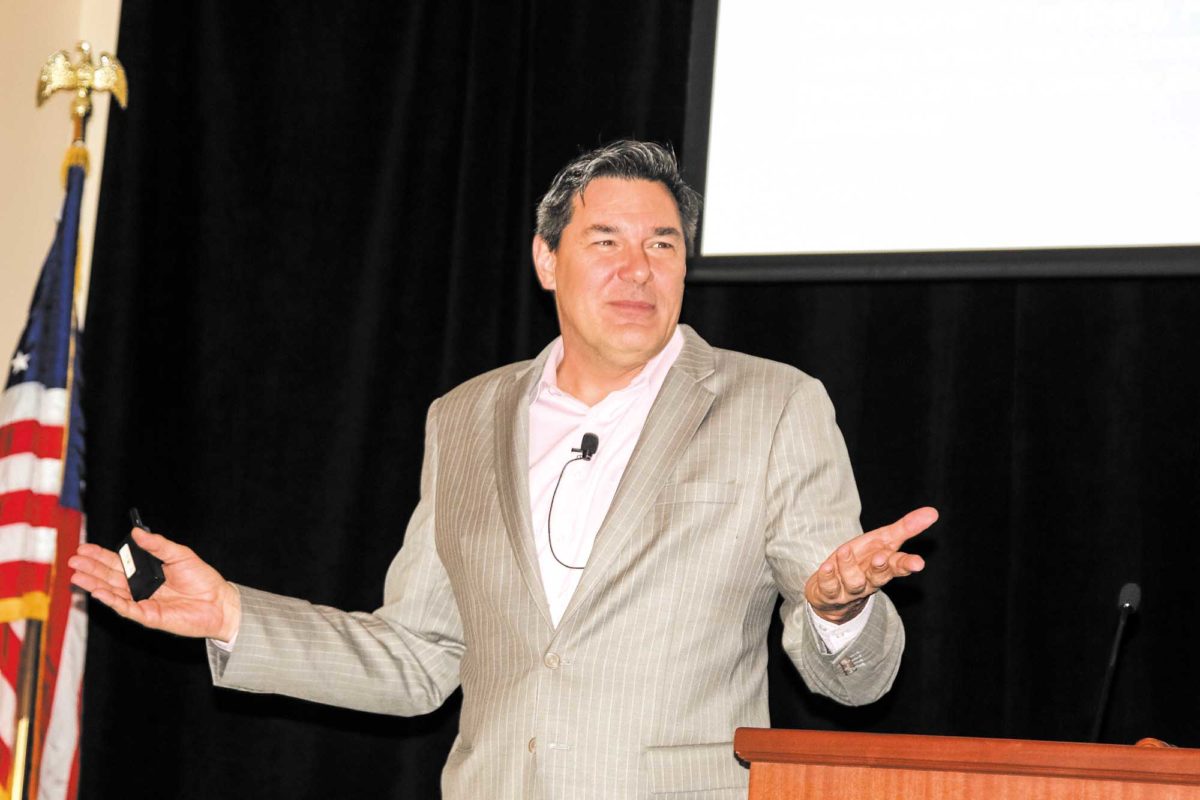Recovery is just around the corner, economist Thornberg tells Palos Verdes Chamber

Beacon Economics founder Christopher Thornberg asks what’s not to like about the economy during his annual South Bay Economics Forecast last at Terranea Resort. Since the pandemic he has remained optimistic, he told the Palos Verdes Chamber during a Zoom presentation last week. Photo
“Same forecast as last year. No end to this expansion in sight, despite all the insane headlines,” economist Christopher Thornberg said last January, at the start of his sixth annual South Bay Economic Forecast Report to the Palos Verdes Chamber of Commerce.
He compared the economy to Goldilocks’ porridge. “Not too hot, not too cold.”
“Investment spending is stable. Interest rates are down. And don’t tell us we need more jobs. Unemployment is at a 50 year low. We have too many jobs. South Bay unemployment is just below full employment. That’s why Terry can’t find workers,” he said, referring to Terranea Resort CEO Terri Haack, who introduced him at the Terranea breakfast.
Last Wednesday, Thornberg again addressed the Peninsula Chamber. This time by Zoom, while driving out to the desert. Terranea was closed because of the pandemic.
But despite the pandemic, 14 percent unemployment and a pogoing stock market, Thornberg’s economic forecast for 2021 was the same as it was in January.
He acknowledged the economy is in a recession, but said, “We believe the majority of jobs will come back, leading to a massive surge in economic activity in the third quarter of this year. This is a ‘V’ shaped downturn, not a ‘U’ or ‘L’”.
Economists who say the high unemployment points to a recession lasting up to a decade are ignoring the reason for the high unemployment, he said.
“Unemployment is usually a lagging indicator. Employers are loath to lay off people. It’s costly to push years of human capital out the door. During the Great Recession, unemployment didn’t peak until the fourth quarter of 2009,” he explained.
“This time, layoffs weren’t because of a shock to the system. They were because of the public health mandates. These are not lost jobs. They are temporary furloughs.
Visually, the economy looks bad, Thornberg acknowledged.
“The highways are empty. Schools and malls are closed. But that’s not the economy. Restaurants, hotels, airlines and tourism equal just 4 percent of GDP,” he said.
“The real estate market is at a 30-year high. Delinquency rates are at a record low. Hedge fund billionaires are saying we’re approaching an economic Armageddon so you will panic and they can buy at the bottom.”
He approved of the federal Payroll Projection plan, but said of the $1,200 stimulus check sent to every adult, “This is starting to sound to me like you’re buying an election.”
“The April numbers show that for every dollar in lost income there was two dollars in government support. Personal income surged between February and April. The personal savings rate went from 6 percent to 33 percent.”
“There’s so much cash on the sidelines, that’s why stocks have gone crazy.
Thornberg dismissed predictions that the pandemic will lead to a new normal. He said offices were getting smaller before the pandemic and that trend will continue. But commercial real estate won’t collapse, he said because, “working at home sucks.”
“We’ve had epidemics since the dawn of time. Shakesear wrote King Lear during the Plague. It opened in London and people came to see it.”
“We’re already on the upside of the V. May employment gained. May spending was beyond what was expected.
There is a wild card, he conceded.
“The wild card is if we see a second wave of the coronavirus. That happens with the flu. But I don’t think it will happen because the coronavirus doesn’t seem to have two waves.
“So stay the course and let the pandemic peter out on its own.
“If it’s a financial crisis you want to worry about, worry about social security and medicare.
“Focus on what matters. Fix the budget, build more housing.
“The economy is not that bad,” Thornberg said. ER

